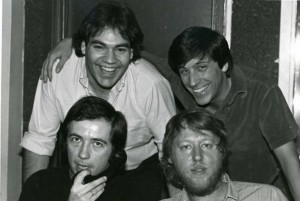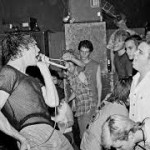I’ve been thinking about college rock, indie rock, whatever you want to call it, this thing that defines the listening habits of over-sensitive young white people, this entity that makes us feel superior to the person sitting across from us on the F Train who looks like they listen to Maroon 5.
I was reflecting on bands from the 1970s like Tin Huey, Pere Ubu, Sneakers, the Shoes, even Suicide, who toured and released non-major label vinyl before there was a clearly delineated college rock touring, radio, and indie label circuit. But around the early-ish 1980s, college rock/indie rock seems to have become a more-or-less recognizable and consistent concept. Can we pinpoint a moment when a loose amalgamation of non-mainstream artists independently releasing records became this thing we readily identify as college rock and indie rock? Surely, there had to be a eureka moment, some kind of invention of the alt-rock wheel, probably around, oh, 1980.
And I think I found it.
His name was Sal Locurto. And if there was a Hall of Fame for College Rock, Sal Locurto has to be in the first class of inductees.

Sal Locurto (upper left) circa 1981, pictured with (clockwise) New Afternoon Show DJ Mike “Pablo” Dugan, Buzzcock Pete Shelley, and Buzzcock producer Martin Rushent.
You might be thinking, “What’s the big deal about that? The college station in my town in 1977 was playing really cool shit.” True, but Sal and WNYU did a couple of things very differently: first, the “old style” college radio station would spin Elvis Costello and the Jam, then they’d play the Allman Brothers and Cat Stevens; you’d be listening to a DJ playing Wreckless Eric, then when you tuned in an hour later, some guy would be playing nothing but Jaco Pastorius and Coltrane. The traditional college radio station had zero consistency. Sal changed that, and changed the definition of college rock dramatically, turning WNYU’s core afternoon programming block into an outlet exclusively for new music. Secondly, Sal passed down the edict that although the music might be highly unconventionally, the mode of delivery wouldn’t be: DJs were to back-announce (i.e., say the name of the songs played and identify the station) after every second song, no exceptions, and DJ segments were to be taut and informative, as opposed to the bong-laced indulgent blabbering heard on other college stations.
Soon, something remarkable happened: Sal’s commitment to exclusively playing new music and presenting it with a professional veneer led to publicists, clubs, and labels recognizing that WNYU could be used to promote their shows and their bands. You could fill a local show by a touring British alternative or American independent act just by getting the record played on WNYU, and the band showing up on air to plug the gig. I honestly believe that the model for new music promotion that existed throughout the 1980s (and into the ‘90s), and new-music marketing groups/conventions like New Music Seminar and CMJ (College Music Journal), owe their naissance to Sal Locurto and WNYU; Sal was literally the first person to create a radio outlet solely for independent and import-only music that was strong and consistent enough to be used as a promotional tool.

Black Flag, doing their thing, around the time Henry Rollins threatened to kill me, but that’s another story

